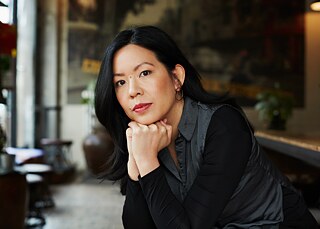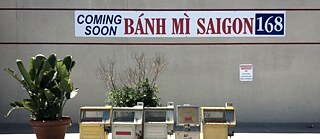„Brothers and Ghosts“ is the story of a young woman from Berlin, who has little interest in her Vietnamese heritage. After her grandmother in California dies, she reluctantly accompanies her parents to the US to attend the reading of her will. Plunged into the Vietnamese community of Little Saigon in Westminster, Orange County, she slowly uncovers a family secret leading back to the Vietnam War.
Driving through Little Saigon the next day, we pass by an expansive shopping mall watched over by a Buddha and three marble statues wearing long capes: the gods of happiness, prosperity, and longevity. The entrance is lined with white columns supporting light-green winged roofs, just like a pagoda. I roll down the window to take a picture. ‘What’s that flag hanging there?’ Between the columns is a yellow flag with three red horizontal stripes. It reminds me of the Spanish flag, but the proportions are all wrong; the red stripes are much thinner than the yellow ones. My father glances over. ‘That’s the flag of South Vietnam.’ ‘But the Vietnamese flag is red and has a yellow star,’ I object. ‘It does now, but before the war, North and South Vietnam had different flags. This one is the flag of the former republic in the South. The one you’re talking about is that of the communists from the North. There was also a red-and-blue flag with a yellow star, which was the symbol of the Viet Cong.’ ‘Complicated. He sighs. ‘The war was very complicated.’ Just as I am about to ask him to explain, he turns up the car radio. I know about the Vietnam War from school, of course, and I am familiar with the images of Ho Chi Minh and the naked girl running from napalm. What I do not know, though, is what the conflict did to my father and his family. Neither he nor my mother have told me anything about it of their own accord, and I’ve never thought to ask, nor have my siblings. The Vietnam War is something that takes place in the history books, or in black-and-white documentaries. It couldn’t be farther from us or our lives in Germany. I look back at the flags until they dissolve into yellow-red stripes in the setting sun. South Vietnam may have been defeated in the war, but in Little Saigon, it apparently lives on. The ghosts of the past still seem to haunt the present day, as if they have unfinished business to take care of.Outside, everything fits the Western mould, though dotted with Vietnamese symbols. While the stores may look typically American, they have names like Saigon City Market Place or Hanoi Corner. The restaurants advertise bánh xèo pancakes, xôi sticky rice, and bánh mì sandwiches. The pharmacies have Vietnamese names, as do the laundromats, the bubble tea stores, and massage parlours whose services are so cheap that it seems criminal (‘1 hour — $15 dollar only!’). I only see a few people walking down the streets, but all of them have black hair and Asian builds that often seem a bit frail compared to Caucasian ones. Here, though, they are among their own, so they don’t all just look short. Some are stocky and athletic, others look petite, while others even seem tall. One lane over, an Asian family with two girls drives by in a pickup. The mother has dyed her hair brown and pinned it up loosely, the father is wearing black architect glasses with a white T-shirt and blazer. I watch them in envy. Who would I be if I had grown up here?
When I think back to my childhood, I see a black-haired girl living in a light-blue house, growing up with the melodic language of her parents. Innocently, I repeated the words with which they rocked me to sleep, tender with happiness at their firstborn child. When I was little, I didn’t know that my family’s world was different to the one around us — that I was growing up on a planet shared by only five people: my mother, my father, my sister, my brother, and me. I began to see it in preschool. There I met Paul and Sarah, who would play with colourful building blocks as I watched in silence. Their parents were tall, blond, and always joking with the childcare workers. My parents were short, black-haired, and always late; when they finally came rushing to get me, I’d be sitting outside the door trying to recreate Paul and Sarah’s building block castles.
As I got older, I could see how different we were. As I grew smarter, I studied how others behaved. For every German word I gained, I shed a Vietnamese one. I forgot the songs I had sung as a toddler and joined the Germans at school as they sang theirs. I wanted spaghetti for dinner, not phở. When my parents had their Vietnamese friends over and sang karaoke, I rolled my eyes. I was always expected to play the piano. My parents always bragged about my marks. My only solace was that the other Vietnamese kids had to endure the same. Together, we stood there cringing as our parents boasted about our exam results or performance in a maths contest.
My German friends seemed to be free from that pressure to achieve. They received money for a B in maths; they started asking their parents for cigarettes at fifteen; and on weekends, they were allowed to stay out as late as they wanted. On the rare occasion they did argue with their parents, it was always followed by a family conversation and words like ‘sorry’ and ‘love’. I never knew this sort of talk from home, so I was bewildered by people sharing their feelings so openly. But being confused was also strange, so I said nothing. I wanted the differences between my family and their families to disappear because our world was small and unusual while theirs was big and universal.
‘Put on something decent, you know how much the Germans mistrust us foreigners!’ my mother used to say with a mixture of fear and menace. I can still hear her today. We were ready to be anything, except who we were. There was no place for us in the Germany of the 1990s. Strangers would stop my father to ask if he had any smuggled cigarettes to sell. Over time, I forgot how to pronounce my own name. Caught up in their immigrant ambitions, my parents let it happen. I was supposed to make it in Germany, whatever the price. Kiều came from a small world, but Kim understood the big one and had no trouble navigating it. She knew how to please Germans, how to become one of them. It’s only here in Little Saigon that I start to wonder if things could have been different (...)
Khuê Phạm talked about „Brothers and Ghosts" on Sep 30. 2024 as part of our Longing/Belonging Festival. The reading was followed by a discussion with the journalist Joshua Yaffa. You can watch a recording of the discussion below or directly on the Goethe-Institut Washington YouTube channel.

Excerpt with permission of the publisher from Brothers and Ghosts, written by Khuê Pham and translated by Daryl Lindsey & Charles Hawley. Published by Scribe Publications in September 2024. Available wherever books are sold.
